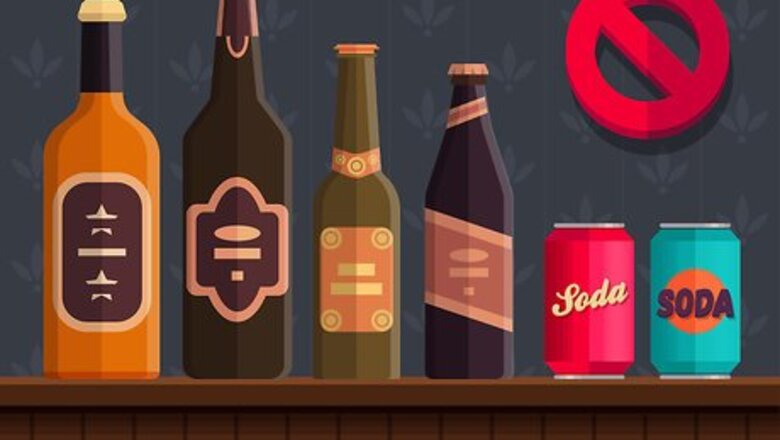
views
X
Research source
[2]
X
Trustworthy Source
National Conference of State Legislatures
Bipartisan, nongovernment organization serving the members of state legislatures and their constituents
Go to source
Drinking Alcohol in Public

Keep bottles and cans sealed. In places where open consumption of alcohol is not permitted, containers of alcohol should be kept sealed. If previously opened, the top should be replaced and sealed. In some states, you are allowed to take home an unfinished bottle of wine or liquor that you purchased at a restaurant or bar. The establishment will re-cork and seal the bottle before you leave. The seal that covers the bottle typically changes color or otherwise indicates if the seal has been removed or tampered with. If you're taking a bottle home from someone else's house, make sure it's sealed tightly and put the bottle itself inside a bag – don't just carry the bottle down the street.

Drink from unmarked containers. Some cities allow people to drink alcoholic beverages in public, but your drink must be in a plain plastic cup. You also may be able to drink beer out of a can, but glass bottles are prohibited for safety reasons. You typically can figure out what types of containers are allowed by observing people around you. For example, if you see people in the streets all drinking out of red plastic cups, you can deduce that you need a red plastic cup to drink alcohol. If you're on a beach or in a park, keep in mind that glass bottles of any sort typically aren't permitted. This has nothing to do with alcohol specifically, but is designed to avoid broken glass that could injure people and wildlife. If you're unsure about the open container laws in a particular location, the safest way to avoid an open container citation is to not drink alcoholic beverages. However, if for some reason you do have an alcoholic beverage, drinking it from an unmarked cup or bottle can avoid unnecessary attention to whatever you're drinking.

Stay within established boundaries. Drinking may be permitted only in specific zones, but prohibited elsewhere. Typically there will be signs or visible barriers that mark specifically where you can carry an open container of alcohol in public. For example, the city may not permit people to drink on public sidewalks. However, you may be allowed to drink alcoholic beverages if you are a patron of a sidewalk café or bar – provided you stay within the established boundaries for the establishment's sidewalk seating area. Another situation in which this restriction may occur is if you're attending a block party or street festival. Drinking may be allowed on the street in the areas blocked off for the party or festival, but you risk an open container citation if you take your drink and walk to another section of town.
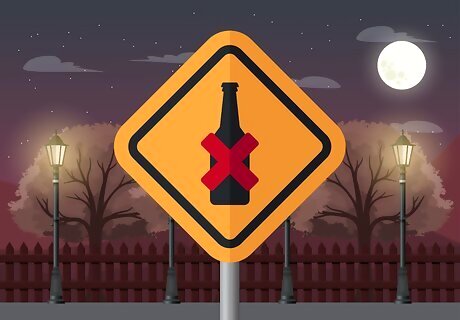
Don't engage in dangerous or disruptive behavior. Regardless of whether open containers are permitted where you are, other state and local laws are still enforced. If you and your friends are acting disorderly, that's a sure way to draw attention to yourselves and risk open container or other citations. This is particularly important if you're in an area where you're unsure about the public consumption laws. If you're walking down the sidewalk in an orderly fashion, obeying all laws, you're unlikely to get stopped for drinking from a plain cup or water bottle. Keep in mind that in areas where open consumption of alcohol is permitted, police officers may be more strict about enforcing other laws designed to ensure public health and safety.

Learn local rules. Open container laws vary widely among states, as well as within individual cities. If you're in an unfamiliar area and want to avoid open container law violations, ask someone what the rules are there. The easiest thing to do is find a uniformed police officer and ask them. However, if you're nervous or intimidated about speaking to police officers, you can ask someone else in a position of authority. For example, if you're on a beach, ask a lifeguard. They typically know the public consumption rules for the beach where they work. You also can ask vendors, people who work in restaurants, or clerks in stores that sell beer or other alcoholic beverages.
Driving in a Vehicle

Don't drink and drive. Driving under the influence is illegal in all 50 states. Even if you haven't consumed enough alcohol to be considered legally intoxicated, drinking alcohol while driving is a dangerous act you should never attempt. In addition, drinking alcoholic beverages while driving is illegal in all states but Mississippi. Even if you aren't legally intoxicated, you still can be charged with an open container law violation. Mississippi does not have any laws against anyone drinking alcoholic beverages in a car. However, if you are driving you still cannot drink to the point of legal intoxication (or beyond). If you get pulled over with an open container of alcohol in your car, the officer must connect it to you as the driver. This means even if your passenger has a can of beer, if she put it in the cup holder where you can easily reach it while driving, you can be charged with the violation.
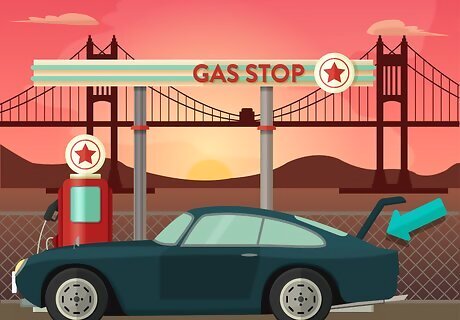
Store open containers in the trunk. If you have previously opened containers of alcohol that you need to transport from one place to another, close them tightly and keep them locked away in a part of your car or truck that you cannot access while driving. Keep in mind that in some states it's illegal to have an open container in the car at all. Even if the open container happens to be in the hand of a backseat passenger, you can still get charged with a violation as the driver for allowing the open container in your car. There are occasions in which you're merely transporting unfinished bottles from one place to another, and generally speaking this isn't illegal. However, these bottles must be closed tightly and placed in an area where neither you or any passengers can access the alcohol while the car is in motion. In most states, this means putting the bottles in the trunk. In some states, you may be able to get away with keeping small opened bottles in a locked glove compartment or other locked storage box inside the passenger compartment of your vehicle.

Throw away empty cans or bottles promptly. The floorboard of your car is not a trash can. If you're pulled over and have empty cans or bottles in your car, you can get a citation for violating the open container law. This is true even if the alcohol was consumed a long time ago or by someone else. If you have an empty bottle that you want to keep for souvenir or sentimental reasons, rinse it out completely before you put it in your car. Put the rinsed bottle in a bag and fold over or close up the top of the bag. Generally, you can be cited for a violation of an open container law if there is any amount of alcohol in the bottle – even a drop. If you have to drive empty alcohol containers to a dumpster or recycling facility, put them in a closed bag and put the bag in the trunk.
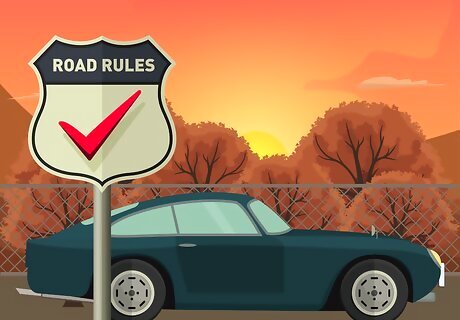
Follow the rules of the road. The simplest way to avoid open container law violations when driving is not to draw attention to your car in the first place. This means obeying the speed limit and all other traffic laws. Don't give a police officer a reason to pull you over. Keep in mind that if an officer pulls you over for some other reason and observes open containers in your vehicle, they have the ability to cite you for an open container violation as well. Unless you know specifically that passengers in moving vehicles are permitted to drink alcohol where you're driving, don't let your passengers drink. When in doubt, keep all alcohol bottles in a closed bag in the trunk of your car.
Riding in a Vehicle
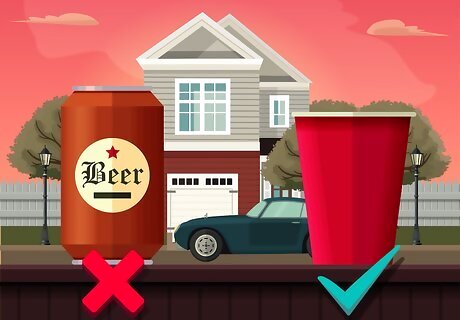
Pour your drink into an unmarked container. Some states allow passengers in a vehicle to have open containers of alcohol. However, you'll typically draw less attention to yourself if you're drinking out of a plain glass or plastic cup. Keep in mind that drinking from a plastic cup is no guarantee that you won't get cited for an open container violation if the car gets pulled over. If you're riding in a car in an area where open containers in vehicles are prohibited, You can be cited for violating this law – even if you weren't aware of the law. However, if you're just bringing along a drink you started at a bar or party, a plastic cup is less suspicious and less likely to draw questions than if you're drinking from a beer can.
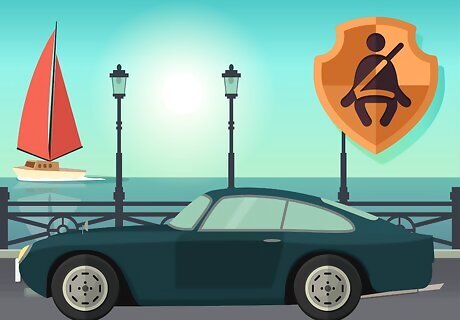
Fasten your seat belt. Particularly if you're driving on city streets or through an entertainment district, police officers will often observe traffic and pull over cars where people are not wearing their seat belts. In addition to a ticket for riding without a seat belt, you may end up with an open container violation if you're also drinking. Even if you're not drinking out of the open container you have, you can still get cited for an open container violation if a police officer pulls the car over because you aren't wearing your seat belt and sees the open container in the car. In some states, the driver also can be charged with a violation of the open container law – even if you had the open container with you in the backseat. In these states, the driver of the car has the responsibility not to allow passengers to bring open containers inside the vehicle with them.
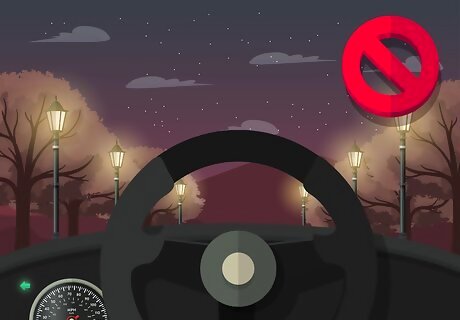
Don't distract the driver. The driver is trying to obey traffic laws and avoid getting stopped. Distracting the driver or engaging in horseplay with other passengers can cause the driver to swerve, endangering other cars on the road. This is something you should avoid doing at any time, regardless of whether there are open containers in the car. However, this also is a way to avoid open container law violations. Basically, allow the driver to concentrate on driving, and don't do anything that would draw attention to the car or cause danger to others on the road. If a police officer sees the driver operating the vehicle erratically, stopping abruptly, or swerving, they may pull the car over, which would mean they'd see the open containers.
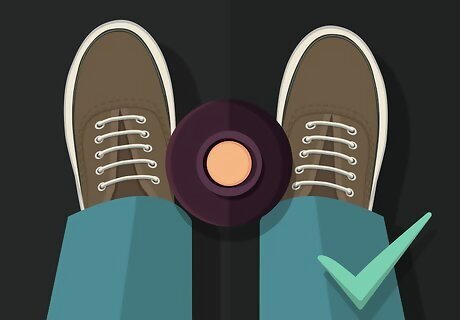
Keep open containers between your feet. Ideally, passengers in a car who have open containers of alcohol should cover them to avoid spills and keep them in the floor while the car is moving, rather than drinking while the car is in motion. There's no legitimate reason why you need to drink an alcoholic beverage while you're riding in a car. However, you may have legitimate reasons to transport an open bottle. For example, you may be getting a ride home from a party. Before you left, the host gave you the remainder of a bottle of wine. Make sure the cork is tight in the bottle, and put the bottle in a paper or plastic bag if possible. Ideally, you want to put the bottle in the trunk – but if your friend is just dropping you off, this may not be an option. While the car is in motion, keep the bottle in the floorboard rather than holding it in your hands.



















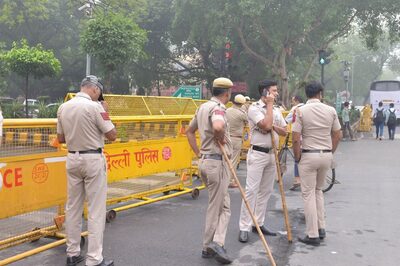
Comments
0 comment